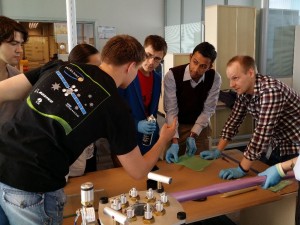Impact on Skoltech (Capacity Building)

Students working at a composites lab, under the guidance of ASPEM center research scientist Fedor Antonov. Students working at a composites lab, under the guidance of ASPEM center research scientist Fedor Antonov. The goal of the hands-on “lesson”: producing a carbon – epoxy composite with vacuum infusion.
The impact on Skoltech that the CREIs and the CREI partners will have is described in topics listed below, which is a set of both impact directions, and also the criteria Skoltech and its stakeholders will use to judge success of the CREIs and the partnership program.
- Research capacity – the capability, know how, and experience to conduct world class research, and the development and transfer of that capacity to the Moscow campus
- Research infrastructure – the accumulation and integration of the research and equipment vital to modern research, the transfer of that infrastructure to Moscow, and the planning on the Moscow campus of facility class research infrastructure
- Educational capacity – the design and delivery of formal curriculum and courses, and informal teaching and learning at the Moscow campus
- Entrepreneurship and Innovation capacity – the know how and experience that must evolve in Moscow in developing ideas with the consideration of use, moving them in an accelerated way towards economic impact, by working with small, medium and large industrial organizations, and if appropriate NGOs and government
- Faculty capacity – attracting, recruiting, mentoring Skoltech researchers, both faculty and post doctoral associates, so that they become among the leading researchers and thought leaders in their fields when they move to Moscow
- Student capacity – attracting, recruiting, admitting and nurturing the best of Russian innovation minded science and engineering students, and a cadre of non-Russian students to internationalize the Moscow campus
- Industry capacity – the ability to engage with industry, understand their needs, solicit their support, shape programs (education, E and I and research), and enlist them on the Moscow based team.
- Convening capacity – the capacity to define agendas, create places for interchange, convene members of the world community, and create impactful opinions
- Building networks – helping to create individual and organizational connections between Skoltech and international universities and scholarly organizations
- Attracting international funding – the ability to attract research funding from non-Russian national and international funding bodies, by participating in successful joint applications for funding for the continuation of the activities of the CREI, as well as other research projects
- Building reputation – ultimately the emergent property of a great university is its reputation, derived from the above capabilities, and linked to brand recognition.